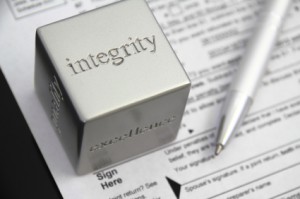Trust, Honesty and Authenticity
A few years ago, Deborah Nixon posted an interesting question on LinkedIn. She asked: “Is there a difference between authenticity and honesty?”
She got about 35 answers. Here’s what I sent in:
Deborah, I’m sure you would agree the two terms cover a lot of territory in common. The trick with these definitional things is not to discover some underlying reality, because there is none; these are conceptual models that help us explain the world. They are good or bad insofar as they help us; so I’d suggest starting there. What’s the most useful way to distinguish the two?
One way might be to say that authenticity is largely passive, and honesty is largely active. When we say someone’s honest, we usually mean they tell the truth, and go out of their way to do it.
Sometimes we also mean that they don’t tell a lie – but that’s far from all the time. You often hear someone way ‘well, he was honest – he didn’t actually tell a lie.’ In such a case, ‘honesty’ just means I didn’t utter an untruth; it’s perfectly consistent with covering up all other kinds of truth. So the casual use of ‘honest’ may rule out sins of commission, but not sins of omission.
That’s why the legal language “the truth, the whole truth, and nothing but the truth” is required in court; to prevent the ‘honest’ witness from conveniently leaving something out, or snow-jobbing the court with irrelevancies.
Authenticity, on the other hand, I think usually implies a lack of attempt to control another’s perception. It means letting others see us as we are, warts and all. I think it also goes one more step: it means letting everyone see us in a way that’s no different from how anyone else see us: that is, we don’t play favorites in terms of constructing alternative fictions to respective people.
At a corporate level, a company might support a claim of honesty by pointing to the truthfulness of its statements, or the lack of court cases against it. Again, ‘honesty’ conveys a sense of ‘never knowingly told an untruth.’ Whether it includes consciously allowing other people to make incorrect inferences by not telling them something – well, that’s not entirely clear.
Authenticity is a whole ‘nother level. It means not hiding out, opening the door in things that are not excluded through standard rules of privacy, letting the chips fall where they may. Further, I think it usually entails a commitment to be authentic, not just a convenient lifestyle.
Seems that of the two, we might say that authenticity is broader (i.e. it encompasses being honest, but goes beyond that to proscribe sins of omission).
On a practical level, people who strive to be honest often talk of it as a struggle: to resist temptation, to not gossip, to say things that can be embarrassing if they are true.
People who choose to be authentic have, in a way, an easier time of it. For someone who is authentic, the daily default way of life doesn’t involve decisions or will power: the default is openness, there is no issue of control vs. transparency.
Things are what they are, and there is no threat about them.
What’s trust got to do with it? To trust a person or a company, honesty is table stakes. If you suspect they’re lying, trust is stopped dead in its tracks. But even if they’re honest, that’s nothing compared to authentic.


 Like trust, integrity is something we all talk about, meaning many different things, but always assuming that everyone else means just what we do. That leads to some vagueness and confusion. But a careful examination of how we use the words in common language is useful.
Like trust, integrity is something we all talk about, meaning many different things, but always assuming that everyone else means just what we do. That leads to some vagueness and confusion. But a careful examination of how we use the words in common language is useful. Credibility is one piece of the bedrock of trust. If people doubt what you say, all else is called into doubt, including competence and good intentions. If others don’t believe what you tell them, they won’t take your advice, they won’t buy from you, they won’t speak well of you, they won’t refer you on to others, and they will generally make it harder for you to deal with them.
Credibility is one piece of the bedrock of trust. If people doubt what you say, all else is called into doubt, including competence and good intentions. If others don’t believe what you tell them, they won’t take your advice, they won’t buy from you, they won’t speak well of you, they won’t refer you on to others, and they will generally make it harder for you to deal with them.